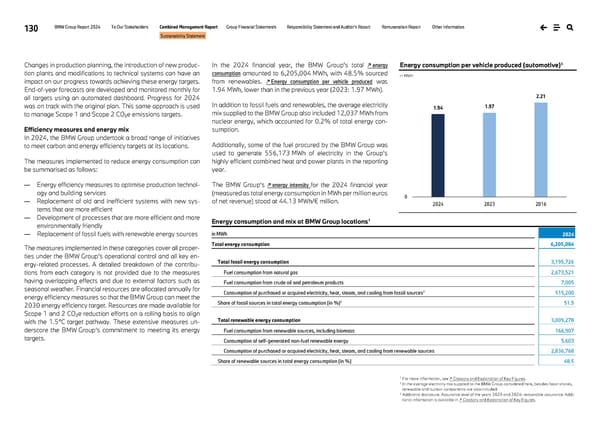130 BMW Group Report 2024 To Our Stakeholders Combined Management Report Group Financial Statements Responsibility Statement and Auditor’s Report Remuneration Report Other Information Sustainability Statement Changes in production planning, the introduction of new produc- tion plants and modifications to technical systems can have an impact on our progress towards achieving these energy targets. End-of-year forecasts are developed and monitored monthly for all targets using an automated dashboard. Progress for 2024 was on track with the original plan. This same approach is used to manage Scope 1 and Scope 2 CO₂e emissions targets. Efficiency measures and energy mix In 2024, the BMW Group undertook a broad range of initiatives to meet carbon and energy efficiency targets at its locations. The measures implemented to reduce energy consumption can be summarised as follows: — Energy efficiency measures to optimise production technol- ogy and building services — Replacement of old and inefficient systems with new sys- tems that are more efficient — Development of processes that are more efficient and more environmentally friendly — Replacement of fossil fuels with renewable energy sources The measures implemented in these categories cover all proper- ties under the BMW Group’s operational control and all key en- ergy-related processes. A detailed breakdown of the contribu- tions from each category is not provided due to the measures having overlapping effects and due to external factors such as seasonal weather. Financial resources are allocated annually for energy efficiency measures so that the BMW Group can meet the 2030 energy efficiency target. Resources are made available for Scope 1 and 2 CO₂e reduction efforts on a rolling basis to align with the 1.5°C target pathway. These extensive measures un- derscore the BMW Group’s commitment to meeting its energy targets. In the 2024 financial year, the BMW Group's total ↗ energy consumption amounted to 6,205,004 MWh, with 48.5% sourced from renewables. ↗ Energy consumption per vehicle produced was 1.94 MWh, lower than in the previous year (2023: 1.97 MWh). In addition to fossil fuels and renewables, the average electricity mix supplied to the BMW Group also included 12,037 MWh from nuclear energy, which accounted for 0.2% of total energy con- sumption. Additionally, some of the fuel procured by the BMW Group was used to generate 556,173 MWh of electricity in the Group’s highly efficient combined heat and power plants in the reporting year. The BMW Group’s ↗ energy intensity for the 2024 financial year (measured as total energy consumption in MWh per million euros of net revenue) stood at 44.13 MWh/€ million. Energy consumption per vehicle produced (automotive)3 in MWh 1 For more information, see ↗ Glossary and Explanation of Key Figures. 2 In the average electricity mix supplied to the BMW Group considered here, besides fossil shares, renewable and nuclear components are also included. 3 Additional disclosure. Assurance level of the years 2023 and 2024: reasonable assurance. Addi- tional information is available in ↗ Glossary and Explanation of Key Figures. 1.94 1.97 2.21 0 2024 2023 2016 in MWh 2024 Total energy consumption 6,205,004 Total fossil energy consumption 3,195,726 Fuel consumption from natural gas 2,673,521 Fuel consumption from crude oil and petroleum products 7,005 Consumption of purchased or acquired electricity, heat, steam, and cooling from fossil sources2 515,200 Share of fossil sources in total energy consumption (in %)2 51.5 Total renewable energy consumption 3,009,278 Fuel consumption from renewable sources, including biomass 166,907 Consumption of self-generated non-fuel renewable energy 5,603 Consumption of purchased or acquired electricity, heat, steam, and cooling from renewable sources 2,836,768 Share of renewable sources in total energy consumption (in %) 48.5 Energy consumption and mix at BMW Group locations1
 BMW Group Report 2024 Page 129 Page 131
BMW Group Report 2024 Page 129 Page 131